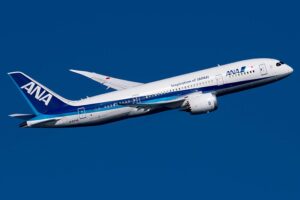
Air Nippon Airways B787 at Haneda Airport
Photo credit: Masahiro TAKAGI (http://tinyurl.com/39s473xc)
On January 17, 2024, a distressing incident happened aboard a Boeing 787 en route from Tokyo to Seattle as a 55-year-old American passenger displayed unruly behavior, biting a flight attendant’s arm. The disruptive conduct prompted the captain to make the unusual decision to return to Haneda Airport, just an hour after departure.
Typically, unruly behaviors in-flight stem from factors such as intoxication, drug use, mental health issues, anxiety, or frustration arising from travel-related problems. However, in this instance, the assailant on flight NH118 seemed to be under the influence of alcohol when he committed the act.
Upon landing, authorities revealed that the passenger, who had taken a sleeping pill, had no recollection of the incident. Fortunately, the targeted flight attendant suffered only minor injuries.
However, this occurrence is not just an isolated one. In 2022, two passengers who physically assaulted crew members and fellow passengers on separate flights with Delta Air Lines and American Airlines where hefty fines were imposed on them.
These levies, totaling $77,272 (RM365,500) and $81,950 (RM387,600), respectively, marked the highest penalties ever levied by the Federal Aviation Administration against individual passengers for disruptive behavior.
Adding to the concerning trend, on January 2, 2024, another unruly passenger on an American Airlines flight from Dallas to Bozeman, Montana, physically assaulted a flight attendant and a police officer, forcing the plane to divert to Amarillo.
As in my previous posting, I narrated another incident years ago during a flight to Frankfurt on a Boeing 777. A drunken passenger had engaged in lewd and unruly behavior, persistently flashing at a particular flight stewardess.
Recognizing this inappropriate behavior and possible sexual harassment charge, we contacted Frankfurt flight operations to relay the matter to the Airport Security. Upon landing, the passenger was escorted off the plane and taken into custody.
Interference with a crew member is defined in Federal Aviation Regulations (FARs) as any act that “assaults, threatens, intimidates, or interferes with a crewmember in the performance of the crewmember’s duties.”
Both the Tokyo Convention (1963) and the Montreal Convention (1971) empower the captain to restrain unruly passengers in-flight, with the option to delegate this responsibility to the crew.
Passengers are universally obligated to adhere to the instructions of the flight crew, including flight attendants, and non-compliance may result in the disruptive individuals being removed from the aircraft in handcuffs.
These incidents highlight the critical need for enforcing stringent measures to ensure the safety and well-being of everyone on board.
View a YouTube video ‘American passenger bites flight attendant, forcing plane to return to Tokyo’